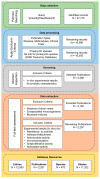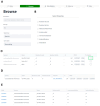Probio-Ichnos: A Database of Microorganisms with In Vitro Probiotic Properties
- PMID: 39458265
- PMCID: PMC11509836
- DOI: 10.3390/microorganisms12101955
Probio-Ichnos: A Database of Microorganisms with In Vitro Probiotic Properties
Abstract
Probiotics are live microorganisms that, when consumed in adequate amounts, exert health benefits on the host by regulating intestinal and extraintestinal homeostasis. Common probiotic microorganisms include lactic acid bacteria (LAB), yeasts, and Bacillus species. Here, we present Probio-ichnos, the first manually curated, literature-based database that collects and comprehensively presents information on the microbial strains exhibiting in vitro probiotic characteristics (i.e., resistance to acid and bile, attachment to host epithelia, as well as antimicrobial, immunomodulatory, antiproliferative, and antioxidant activity), derived from human, animal or plant microbiota, fermented dairy or non-dairy food products, and environmental sources. Employing a rigorous methodology, we conducted a systematic search of the PubMed database utilizing the keyword 'probiotic' within the abstracts or titles, resulting in a total of 27,715 studies. Upon further manual filtering, 2207 studies presenting in vitro experiments and elucidating strain-specific probiotic attributes were collected and used for data extraction. The Probio-ichnos database consists of 12,993 entries on the in vitro probiotic characteristics of 11,202 distinct strains belonging to 470 species and 143 genera. Data are presented using a binary categorization approach for the presence of probiotic attributes according to the authors' conclusions. Additionally, information about the availability of the whole-genome sequence (WGS) of strains is included in the database. Overall, the Probio-ichnos database aims to streamline the navigation of the available literature to facilitate targeted validation and comparative investigation of the probiotic properties of the microbial strains.
Keywords: adhesion; antimicrobial activity; antioxidant capacity; antiproliferation; database; immunomodulation; in vitro properties; probiotics; strain specificity.
Conflict of interest statement
The authors declare no conflicts of interest.
Figures





References
-
- Joint FAO/WHO Working Group Report on Drafting Guidelines for the Evaluation of Probiotics in Food, London, ON, Canada, 30 April and 1 May 2002. [(accessed on 18 July 2024)]. Available online: https://isappscience.org/wp-content/uploads/2019/04/probiotic_guidelines....
-
- Vakadaris G., Stefanis C., Giorgi E., Brouvalis M., Voidarou C.C., Kourkoutas Y., Tsigalou C., Bezirtzoglou E. The Role of Probiotics in Inducing and Maintaining Remission in Crohn’s Disease and Ulcerative Colitis: A Systematic Review of the Literature. Biomedicines. 2023;11:494. doi: 10.3390/biomedicines11020494. - DOI - PMC - PubMed
Grants and funding
LinkOut - more resources
Full Text Sources
Miscellaneous

